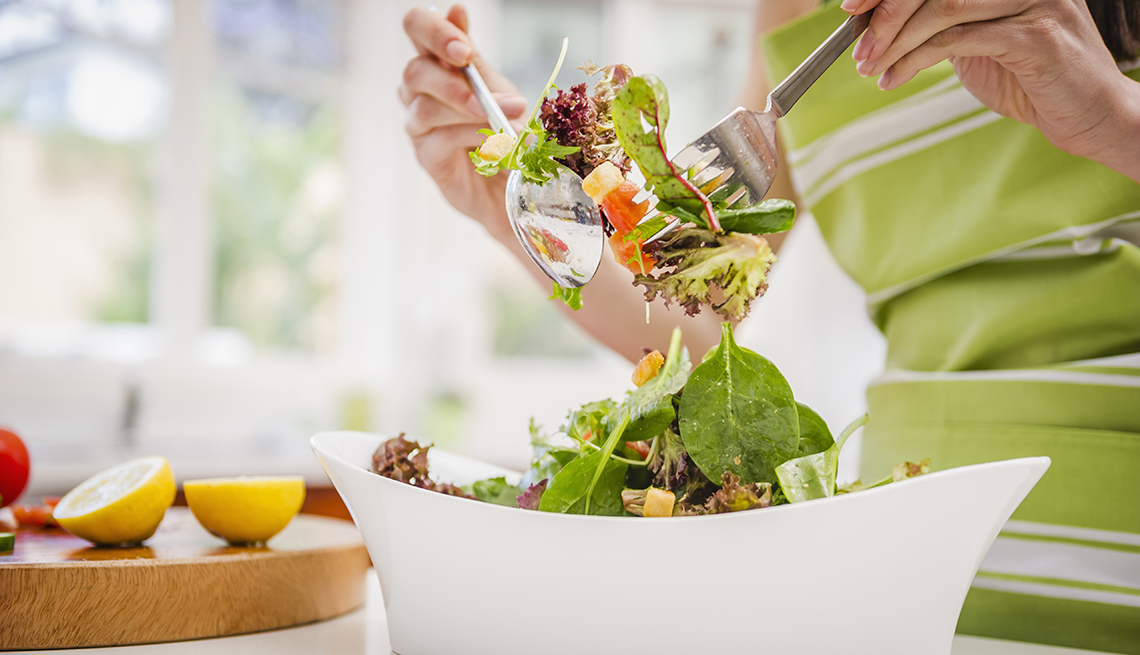If you want to boost your immune health, you may wonder how to help your body fight off illnesses.
While bolstering your immunity is easier said than done, several dietary and lifestyle changes may strengthen your body’s natural defenses and help you fight harmful pathogens, or disease-causing organisms.
Here are some tips to strengthen your immunity naturally.
1. Stay active
Working out is a powerful way to boost your immune system, says Mark Moyad, M.D., M.P.H., Jenkins/Pokempner director of preventive and alternative medicine at the University of Michigan Medical Center. It causes your body's antibodies and white blood cells to circulate more rapidly, which means they may be able to detect and zero in on bugs more quickly. Being active this way also lowers stress hormones, which reduces your chances of getting sick, Moyad adds.
Research suggests that exercise's effects may be directly relevant to virus fighting, too. According to a recent study published in the British Journal of Sports Medicine, of 1,002 people surveyed, those who exercised at least five days a week had almost half the risk of coming down with a cold as those who were more sedentary. If they did get one, they reported less severe symptoms. There also may be a protective benefit from the sweat in your sweat session: Research has shown that simply raising your body temperature may help kill germs in their tracks.
The key to exercise, however, is to do it in moderation. “Like many other things, there's a sweet spot — doing too much can also put so much stress on your body, it depresses your immune system,” explains Moyad. He recommends 30 to 60 minutes of exercise (either vigorous or moderate) most days of the week.
For the latest coronavirus news and advice go to immunesupport/coronavirus.

Help your body fight off illnesses by feeding it nutrient-rich foods such as whole grains, fruits and vegetables.
2. Watch your diet
"Eighty percent of your immune system is in the gut, so when it's healthy, we tend to be able to fight off infections faster and better,” says Yufang Lin, M.D., of the Center for Integrative Medicine at the Cleveland Clinic. “When it's not, our immune system is weaker and more susceptible to fighting off infection.”
In general, Lin recommends that people focus on a Mediterranean style of eating, which means a diet rich in fruits, vegetables, whole grains and healthy fats, found in foods such as fatty fish, nuts and olive oil. “This eating pattern is high in nutrients such as vitamin C, zinc and other antioxidants shown to help reduce inflammation and fight infection,” she explains. Adults between the ages of 65 and 79 who followed a Mediterranean type of diet, along with taking a daily 400 IU vitamin D supplement for a year, showed small increases in disease-fighting cells such as T cells, according to a 2018 study published in the journal Frontiers in Physiology.
It's also important to limit meat, especially processed and fried foods, all of which are more inflammatory, Lin adds. “Generally, I recommend a whole food diet,” she says. What's more, it's smart to include fermented foods, such as yogurt, sauerkraut, miso and kefir, in your daily diet. These help build up the good bacteria in your gut, which, in turn, supports a healthy gut and immune system, Lin explains.
3. Stay on top of stress
There's a strong link between your immune health and your mental health. “When you're under chronic stress or anxiety, your body produces stress hormones that suppress your immune system,” Moyad says. Research done at Carnegie Mellon University has found that people who are stressed are more susceptible to developing the common cold.
In one study, published in Proceedings of the National Academy of Sciences, 276 healthy adults were exposed to the cold virus, then monitored in quarantine for five days. Those who were stressed were more likely to produce cytokines, molecules that trigger inflammation, and were about twice as likely to get sick. In addition, people who are stressed are less likely to pay attention to other healthy habits, like eating right and getting enough sleep, which can affect immunity, Lin adds.
Although you can't avoid stress in your life, you can adopt strategies to help you manage it better. A 2012 study, published in Annals of Internal Medicine, looked at adults 50 and older and found that those who either did a daily exercise routine or performed mindfulness meditation were less likely to get sick with a respiratory infection than subjects in a control group, and if they did get sick, they missed fewer days of work.
4. Get enough sleep
Z's are another natural immune system booster. “Your immune system is like your computer — it needs moments of rest so it doesn't become overheated,” Moyad explains. “Sleep reboots the system.”
When you're sleep-deprived, he adds, your body churns out stress hormones like cortisol to keep you awake and alert, which can suppress your immune system. People who got a full eight hours of shut-eye had higher levels of T cells than those who slept less, according to a 2019 study. Try to get at least seven hours of slumber a night, as a 2015 study, published in the journal Sleep, found that people who did so were four times less likely to come down with a cold than those who clocked less than six.

Adding more herbs to your diet, such as garlic, can provide an extra boost to your immune system.
5. Be strategic about supplements
There's no magic herb or vitamin you can pop to automatically prevent a cold, flu or other virus. But a 2017 review of 25 studies, published in the British Medical Journal, found that a moderate daily dose of vitamin D may offer protection if you're already low in the sunshine vitamin, points out Tod Cooperman, M.D., president and editor in chief of ConsumerLab.com.
The best way to find out if you're lacking in vitamin D is to get your blood levels tested; you should be between 20-39 ng/mL (nanograms per milliliter). If you're within that range, a daily supplement of about 600 to 800 IU is fine. If you're low, talk with your doctor about additional supplementation — up to 2,000 IU a day. Cooperman advises taking it with meals that contain fats or oils, to increase absorption.
The Cleveland Clinic’s Lin also recommends cooking with herbs such as garlic, ginger, rosemary, oregano and turmeric. All have been shown to have anti-inflammatory properties, she explains, and some, like garlic, have even been shown to be protective against colds. “When my patients ask me about taking supplements to enhance their immune system, I always go back to food, food, food,” she says. “Food is medicine."
Editor's note: This story has been updated to reflect current health guidelines related to social distancing.
Feeding your body certain foods may help keep your immune system strong.
If you’re looking for ways to prevent colds, the flu, and other infections, your first step should be a visit to your local grocery store. Plan your meals to include these 15 powerful immune system boosters.
Most people turn straight to vitamin C after they’ve caught a cold. That’s because it helps build up your immune system.
Vitamin C is thought to increase the production of white blood cells, which are key to fighting infections.
Almost all citrus fruits are high in vitamin C. With such a variety to choose from, it’s easy to add a squeeze of this vitamin to any meal.
Popular citrus fruits include:
Because your body doesn’t produce or store it, you need daily vitamin C for continued health. The recommended daily amount for most adults is:
- 75 mg for women
- 90 mg for men
If you opt for supplements, avoid taking more than 2,000 milligrams (mg) a day.
Also keep in mind that while vitamin C might help you recover from a cold quicker, there’s no evidence yet that it’s effective against the new coronavirus, SARS-CoV-2.
If you think citrus fruits have the most vitamin C of any fruit or vegetable, think again. Ounce for ounce, red bell peppers contain almost 3 times as much vitamin C (127 mg ) as a Florida orange (45 mg ). They’re also a rich source of beta carotene.
Besides boosting your immune system, vitamin C may help you maintain healthy skin. Beta carotene, which your body converts into vitamin A, helps keep your eyes and skin healthy.
Broccoli is supercharged with vitamins and minerals. Packed with vitamins A, C, and E, as well as fiber and many other antioxidants, broccoli is one of the healthiest vegetables you can put on your plate.
The key to keeping its power intact is to cook it as little as possible — or better yet, not at all. Research has shown that steaming is the best way to keep more nutrients in the food.
Garlic is found in almost every cuisine in the world. It adds a little zing to food and it’s a must-have for your health.
Early civilizations recognized its value in fighting infections. Garlic may also slow down hardening of the arteries, and there’s weak evidence that it helps lower blood pressure.
Garlic’s immune-boosting properties seem to come from a heavy concentration of sulfur-containing compounds, such as allicin.
5. Ginger
5. Ginger
Ginger is another ingredient many turn to after getting sick. Ginger may help decrease inflammation, which can help reduce a sore throat and inflammatory illnesses. Ginger may help with nausea as well.
While it’s used in many sweet desserts, ginger packs some heat in the form of gingerol, a relative of capsaicin.
Ginger may also decrease chronic pain and might even possess cholesterol-lowering properties .
Spinach made our list not just because it’s rich in vitamin C — it’s also packed with numerous antioxidants and beta carotene, which may both increase the infection-fighting ability of our immune systems.
Similar to broccoli, spinach is healthiest when it’s cooked as little as possible so that it retains its nutrients. However, light cooking makes it easier to absorb the vitamin A and allows other nutrients to be released from oxalic acid, an antinutrient. Check out some spinach recipes here.
Look for yogurts that have the phrase “live and active cultures” printed on the label, like Greek yogurt. These cultures may stimulate your immune system to help fight diseases.
Try to get plain yogurts rather than the kind that are flavored and loaded with sugar. You can sweeten plain yogurt yourself with healthy fruits and a drizzle of honey instead.
Yogurt can also be a great source of vitamin D, so try to select brands fortified with this vitamin. Vitamin D helps regulate the immune system and is thought to boost our body’s natural defenses against diseases.
Clinical trials are even in the works to study its possible effects on COVID-19.
When it comes to preventing and fighting off colds, vitamin E tends to take a backseat to vitamin C. However, this powerful antioxidant is key to a healthy immune system.
It’s a fat-soluble vitamin, which means it requires the presence of fat to be absorbed properly. Nuts, such as almonds, are packed with the vitamin and also have healthy fats.
Adults only need about 15 mg of vitamin E each day. A half-cup serving of almonds, which is about 46 whole, shelled almonds, provides around 100 percent of the recommended daily amount.
Sunflower seeds are full of nutrients, including phosphorous, magnesium, and vitamins B-6 and E.
Vitamin E is important in regulating and maintaining immune system function. Other foods with high amounts of vitamin E include avocados and dark leafy greens.
Sunflower seeds are also incredibly high in selenium. Just 1 ounce contains nearly half the selenium that the average adult needs daily. A variety of studies, mostly performed on animals, have looked at its potential to combat viral infections such as swine flu (H1N1).
You may know turmeric as a key ingredient in many curries. This bright yellow, bitter spice has also been used for years as an anti-inflammatory in treating both osteoarthritis and rheumatoid arthritis.
Both green and black teas are packed with flavonoids, a type of antioxidant. Where green tea really excels is in its levels of epigallocatechin gallate (EGCG), another powerful antioxidant.
In studies, EGCG has been shown to enhance immune function. The fermentation process black tea goes through destroys a lot of the EGCG. Green tea, on the other hand, is steamed and not fermented, so the EGCG is preserved.
Green tea is also a good source of the amino acid L-theanine. L-theanine may aid in the production of germ-fighting compounds in your T cells.
Like papayas, kiwis are naturally full of a ton of essential nutrients, including folate, potassium, vitamin K, and vitamin C.
Vitamin C boosts the white blood cells to fight infection, while kiwi’s other nutrients keep the rest of your body functioning properly.
When you’re sick and you reach for chicken soup, it’s more than just the placebo effect that makes you feel better. The soup may help lower inflammation, which could improve symptoms of a cold.
Poultry, such as chicken and turkey, is high in vitamin B-6. About 3 ounces of light turkey or chicken meat contains nearly one-third of your daily recommended amount of B-6.
Vitamin B-6 is an important player in many of the chemical reactions that happen in the body. It’s also vital to the formation of new and healthy red blood cells.
Stock or broth made by boiling chicken bones contains gelatin, chondroitin, and other nutrients helpful for gut healing and immunity.
Shellfish isn’t what jumps to mind for many who are trying to boost their immune system, but some types of shellfish are packed with zinc.
Zinc doesn’t get as much attention as many other vitamins and minerals, but our bodies need it so that our immune cells can function as intended.
Varieties of shellfish that are high in zinc include:
- oysters
- crab
- lobster
- mussels
Keep in mind that you don’t want to have more than the daily recommended amount of zinc in your diet:
- 11 mg for adult men
- 8 mg for most adult women
Too much zinc can actually inhibit immune system function.
Variety is the key to proper nutrition. Eating just one of these foods won’t be enough to help fight off the flu or other infections, even if you eat it constantly. Pay attention to serving sizes and recommended daily intake so that you don’t get too much of a single vitamin and too little of others.
Eating right is a great start, and there are other things you can do to protect you and your family from the flu, cold, and other illnesses.
Start with these flu prevention basics and then read these 7 tips for flu-proofing your home. Perhaps most importantly, get your annual flu vaccine to protect yourself and other
















0 Comments